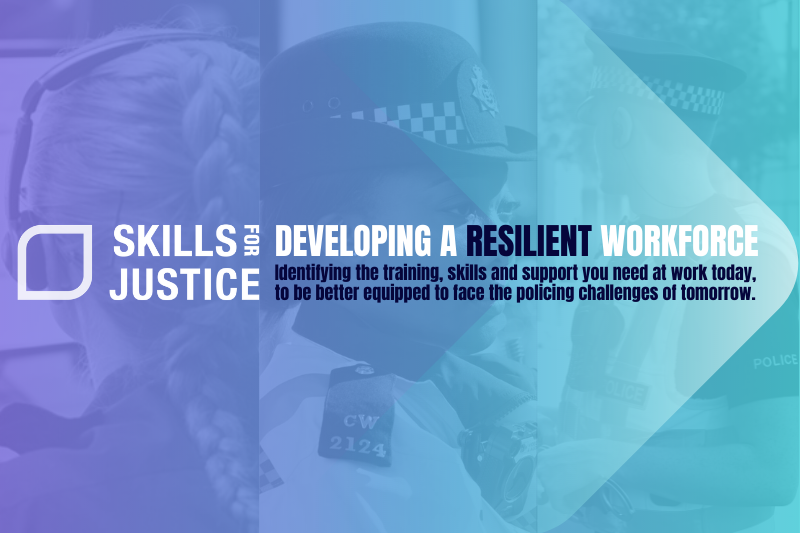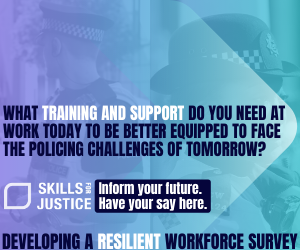The subsequent findings will help government and sector leaders to better understand the complex skills issues that they will need to address, in order to equip the service to meet future challenges.
Over the last twelve months, the UK’s justice sector has undergone enormous change, mobilising effective cross-sector collaboration and flexibilities at pace, to adapt and respond to unparalleled demand. The remarkable resilience and dedication of staff across policing, wider law enforcement and crime prevention to deliver services in the midst of such adversity is incredible but has been tested to the limits. As the workforce continue to face ongoing challenges due to the impact of COVID-19, as well as from pre-pandemic operating conditions, how can this resolve be strengthened and working-life improved to reduce the risk of burnout, both now and in the future?
Since 2010, our academically trained research team at Skills for Justice, the Sector Skills Council for the UK Justice and Community sectors, have conducted a national biennial study assessing the current skills and competency needs of the entire police workforce. During this time, these vital findings have helped shape the delivery of workforce initiatives and people strategies, supporting employers to make evidence-based decisions and to target effective resources in their efforts to improve the workplace.
As the nation emerges from the pandemic there has never been a greater need to address challenges in policing workforce development. This year’s ‘Developing a Resilient Workforce Survey’ is focused on improving staff’s resilience and wellbeing, particularly in light of the immense trials we have all experienced in the last twelve months. The subsequent findings will help government and sector leaders to better understand the complex skills issues that they will need to address, in order to equip the service to meet future challenges.
Much of the change brought about by Covid-19 was forced to happen overnight. That so many staff risked their personal mental and physical health is testimony to the commitment and dedication of the workforce. Yet, while personal resilience is a wonderful characteristic, it should not be the default requirement. If we are to build a police service which is better adept to meeting the challenges of the 21st century and vitally improve the safety of our communities, we must first improve the workplace for our policing people.
Change is constant, and the inability for staff to accept or adapt to it is inevitable when introducing new working practices. Consequently, resilience issues remain one of the biggest concerns facing the sector and now is the time to ensure long-term, strategic plans are based on an accurate, evidence-based understanding of the needs of the workforce.
The initial survey stage of the project aims to identify critical shortages, at an individual, organisational and systemic level, of cross-sector skills gaps, the impact on learning due to Covid-19, ongoing training needs, flexible and remote working, equality, diversity, and inclusion at work, as well as structural and people development requirements to support an ever-increasing complex workforce.
This evidence will provide an invaluable overview of the current shape of police forces nationwide. Once analysed, the results will form a comprehensive report to support governing bodies and policing leaders to implement measures that will not only protect staff from pressures that pre-date the pandemic but, crucially, address the new challenges they will continue to face as a result of it.
By participating in this survey, employers and employees can play their part in informing decisive action for their workforce, to not only overcome the obstacles it faces in recovering after COVID-19 but shape the role of the modern police service and how it should evolve over the next 20 years.
Having a police service that is able to look back at the changes that have already taken place over the last year or so, learn from them, and translate that learning into what it means practically for future workforce resilience, is key. With the upcoming autumn release of the independent ‘Strategic Review of Policing in England and Wales‘ looking to set out substantial recommendations for a long-term strategic direction for the service, our report will help bolster this proposed vision with the workforce planning capabilities required.
The ability to collaborate, cope with challenges, lead effectively, embrace technology, communicate, and interact well with others, are the main concerns we continue to see across the policing workforce. Participants in our previous research have told us that the impact these skills deficits have is vast, ranging from the creation of extra pressure on those fewer staff with the right skills, through to inhibiting motivation, increasing absenteeism, and leading to difficulties in meeting internal quality standards and external public expectations. Creating a culture of workforce resilience is vital to shaping the future system.
Reflective and reflexive engagement and dialogue must underpin today’s resilience strategies in order to frame tomorrow’s workforce. Basing long-term workforce planning on the best available data will not only make the system more resilient and help it retain the incredible people it has but make it a more attractive place for others to join. Together, we can ensure our forces are both truly representative of the communities they service and have the skills the public requires.
Since joining Skills for Justice as an associate earlier this year, former senior British Police Officer and Chief Executive of the College of Policing, Mike Cunningham QPM, has been working closely with the team on a range of initiatives to support the future-proofing of policing. Having his wealth of experience and in-depth grasp of the workforce challenges and opportunities facing policing today has been invaluable in helping us formulate our approach to this year’s survey focus. What’s more, the importance he places on developing future strategy founded on a thorough understanding of the needs of the entire workforce, very much aligns with our own belief in the efficacy of evidence-based policing.
By participating in this survey, employers and employees can play their part in informing decisive action for their workforce, to not only overcome the obstacles it faces in recovering after COVID-19 but shape the role of the modern police service and how it should evolve over the next 20 years.
The future will continue to bring new layers of complexity, new challenges, and new opportunities for the sector. Our police workforce needs the training and support which can better match this ever-increasing complexity. If we can start preparing leaders for upcoming challenges today, then tomorrow’s workforce will be better equipped and more resilient to meet them.
Have your say and complete the survey now
The survey will be live until June 30, 2021, with the research findings published in a full public report in the autumn. For every completed survey response, Skills for Justice are donating 10p to MenCap, the leading charity for people with a learning disability.





I have been reading some interesting systematic reviews on resilience training in the workplace, and some have included police intervention research (see also Robertson et al., 2015). DOI: 10.1111/joop.12120
Thanks Matty – that’s really helpful – I’ll get my team onto that link. Cheers. Jon
Pleasure Jon!
We are often reminded of the strict difference between organisational and personal resilience, and it was interesting to read in the aforementioned paper, the variations in defining ‘resilience’. Of course both organisational and personal resilience should work harmoniously, with the personal element being high on the agenda.